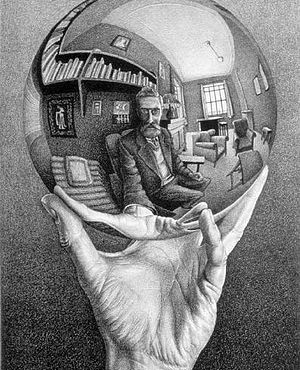Self-reflection

A defining differentiation between us and all other living things on this planet is our extraordinary ability for self-reflection. This trait allows us to look at ourselves and evaluate our emotional, physical, and metaphysical states. In its less obvious form, self-reflection strengthens our conscience by helping us identify and enforce our own moral awareness. In its more obvious form, it strengthens our ego by helping us define who we are and what we desire. Self-reflection, however, is not infallible. In his drawing, Hand With Reflecting Sphere, M.C. Escher, the great Dutch sketch artist, shows how reality and self-reflection merge as they intermingle creating a new version of reality itself. Escher’s hand is holding a sphere containing a distorted reflection of himself, and in this instance the interplay between Escher and his reflection in the sphere gives the viewer a slight misinterpretation of Escher’s appearance. Our process is very similar to this. We incorporate events into our lives that co-mingle facts with our particular self-reflective interpretation of those facts. The result is a mixture of reality and interpretation that imbues “our” reality with a slight bias, or distortion. With each of us having a separate and distinct reality, even of the same events, it makes for endless conversations, arguments, and debates about what is “real.”
Concepts In MotionMar 7th, 20130 comments
-
Recent Posts
Categories
Archives
- November 2023
- January 2023
- May 2022
- January 2022
- September 2021
- July 2021
- September 2020
- May 2020
- March 2020
- December 2019
- November 2019
- July 2019
- September 2018
- July 2018
- April 2018
- January 2018
- October 2017
- May 2017
- November 2016
- September 2016
- March 2016
- August 2015
- March 2015
- December 2014
- October 2014
- September 2014
- July 2014
- June 2014
- March 2014
- December 2013
- September 2013
- July 2013
- June 2013
- April 2013
- March 2013
- February 2013
- January 2013
About the Author
Larry Laveman, LCSW, BCD, is a Psychotherapist and Author in Solana Beach, California. His publications include topics on marriage counseling, supervision, mental health and spirituality. He is the former Chief Clinical Director for Harmonium, Inc., a community based nonprofit organization specializing in children, adolescents and families. You can find contact him via Google +, LinkedIn, or this website's contact page.
